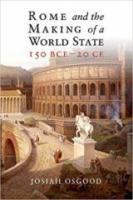
CUP (2018) p/b 274pp £21.99 (ISBN 9781108413190)
O. is using the term ‘world state’ in a proleptic sense. Rome was in fact a collapsing state during the period covered by the book, but his purpose in writing it is to demonstrate that important changes were going on under the surface during this time which were to lay the foundations for the development of a ‘world state’ (as Romans at least thought of it) from Augustus onwards. Indeed, ‘Foundations’ rather than ‘Making’ would perhaps have made a more accurate title.
O. organises the argument round the classic initialism SPQR. Under the republic, S and P worked largely in harmony; it all fell apart when S and P became irreconcilably sundered during the last 100 years, leaving power vacuums (vacua?) for the Sullas, Pompeys and Caesars to exploit in their own interests and that of their supporters, Romans and provincials alike. O., professor of classics at Georgetown University, Washington DC and a prolific author on the period, tells this side of the well-known story in great detail, considerably helped by excellent maps and illustrations and full reading lists accompanying each chapter, and in the process the outlines of the new imperial system can be discerned. The reviewer concentrates on these.
One important development in the period under discussion that contributed towards the ‘making of a world state’ was in provincial government. In fact, as O. admits, that process actually began much earlier, during the conquest of Italy, when Rome learned how to make friends out of enemies by various types of treaty and alliance and started sending out colonies. But O. homes in on the Gracchi brothers (133-121 BC). Between them they ensured that taxes from provinces, previously collected internally and spent by governors, would now be collected centrally by Rome and spent partly on the poor (funding Tiberius’ land commission and providing grain at a fixed price under Gaius’ dispensation). The result was more efficient collection and a huge rise in revenue—essential when it came to expanding the empire. Further, this move brought the equites, who collected the taxes, into prominence, as did Gaius’ law that they should sit on the provincial governors’ corruption courts. Equites would play an increasing part under the imperial regime.
Gaius again was responsible for re-raising the question of the status of Italian allies and beginning the process of giving them all full Roman citizenship. It was defeated (and Gaius committed suicide during a massive assault on his followers). But the issue would not go away and the Italians finally got their wish after the Social War (91-88 BC). The idea of radical change which rewarded old allies by turning them into Roman citizens was born.
Sulla was another key figure. His dictatorship was unlimited, with a new specific duty: ‘to write laws and put the state back in order’. Julius Caesar would give himself the same mandate, paving the way for the idea of a sole ruler. All the struggles that accompanied these dramatic changes suggested new ways of running what was fast becoming an increasingly ragged SPQR.
But despite internal chaos, Rome was expanding economically at this time as it reaped the benefits of its overseas territories. Towns like Pompeii provide evidence of growing wealth from markets opening up in Gaul, Spain and Africa. Pompey’s conquests in the East and Caesar’s in the West vastly increased Rome’s wealth, economic reach and territorial grip, and this too led to a different sort of state, where the relationship between S and P seemed less important than what charismatic individuals like Pompey and Caesar could bring both into the public coffers and the pockets of their followers—especially as the S seemed dedicated to thwarting their every move. The civil war of 49 BC between Pompey and Caesar confirmed just how completely the republican system had broken down. At the same time, good governance in the new provinces, of the sort exemplified by Cicero, showed what could be done: it did not have to be all blood and thunder. Nor was it all one-way traffic: Romans brought their business into the provinces, and the provinces theirs into Rome.
So when Augustus emerged as princeps, the outlines of a new sort of imperial power could already be discerned. But the one thing he had to do, as the last hundred bloody years had demonstrated all too clearly, was to rein in the military and bring it back under central control. His construction of a new professional soldiery, answering to the emperor alone and with fixed and generous terms of service, brought about that crucial change.
O. has given an important new twist to the story of the fall of the Roman republic. His analysis will be widely welcomed.
Peter Jones
